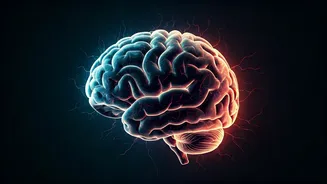Sleep's Complex Role
Sleep, as a crucial biological function, enables the body to recharge, repair tissues, and consolidate memories. It's often seen as a period of inactivity,
but it's an incredibly dynamic process. When we sleep, our brains go through various cycles, including REM (Rapid Eye Movement) sleep, vital for dreaming and cognitive function, and non-REM sleep, which allows for physical restoration. Disruptions to sleep, whether due to stress, illness, or external factors, can have widespread effects. These include difficulties in concentration, impaired mood regulation, and a weakened immune system. The standard recommendation is to have between seven and nine hours of sleep per night for adults, but individual requirements vary greatly, with some people requiring more or less to feel rested and function optimally. The quality of sleep is equally critical; even if you spend ample time in bed, the depth and stages of your sleep matter a lot.
Hormonal Influences
Several hormones are central to managing energy levels and how we experience fatigue. Cortisol, frequently referred to as the “stress hormone,” plays an important role. Normally, cortisol levels are naturally low during sleep and peak in the morning, which helps you wake up and feel alert. However, when sleep is disrupted, the body’s cortisol release may become dysregulated. It could potentially rise at unusual times, providing a temporary boost of energy even with minimal sleep. Adrenaline, another hormone that is produced in response to stress, can also cause this effect. Adrenaline initiates the 'fight-or-flight' response, increasing heart rate and blood pressure, boosting energy temporarily. Additionally, ghrelin and leptin, hormones that regulate appetite, are affected by sleep. Lack of sleep can disturb the balance of these hormones, potentially leading to increased hunger and cravings. Understanding the interplay of these hormones provides insight into why you can sometimes feel energetic despite sleep deprivation.
Brain's Adaptive Mechanisms
The brain has a remarkable capacity to adapt to various circumstances, including sleep deprivation. One significant mechanism is the brain's ability to activate certain areas and pathways to compensate for the loss of rest. When you don't get enough sleep, specific brain regions, like the prefrontal cortex (involved in decision-making and cognitive control), can become more active. This increased activity is the brain’s attempt to maintain cognitive function and enable you to perform tasks. Also, the brain may shift its reliance on particular neurotransmitters, such as dopamine, to enhance alertness. Dopamine, associated with pleasure and motivation, can stimulate feelings of energy and focus. The brain uses these methods to maintain performance in short periods of sleep deprivation. However, these adaptations are not sustainable. Chronic sleep deprivation can overwhelm these systems, leading to more significant deficits in cognitive performance and emotional regulation.
Individual Variability Factors
Individual responses to sleep deprivation vary widely. This variation stems from genetic predisposition, overall health, and lifestyle. Some individuals have a higher natural tolerance to sleep loss, possibly due to genetic factors that influence brain function and sleep regulation. Other lifestyle factors that come into play include the types of tasks you perform, your daily schedule, and your habits. For instance, people who engage in activities that are stimulating or have deadlines may experience a short-term boost in alertness. Conversely, people with underlying health conditions, such as depression or chronic pain, might feel the effects of sleep deprivation more intensely. In addition, the individual's mental and physical health also plays an important role. Those in good physical condition might be better equipped to manage the negative impacts of sleepless nights. Age also contributes to your response: the elderly may experience altered sleep patterns and be more susceptible to the effects of sleep loss.
Practical Considerations & Advice
Although you might experience temporary alertness with minimal sleep, it’s vital to acknowledge that sleep deprivation is not sustainable or healthy. Prioritize proper sleep by establishing a regular sleep schedule, creating a relaxing bedtime routine, and making sure your sleep environment is conducive to rest. Avoid stimulants like caffeine and nicotine, especially before bed. If you have any ongoing issues with sleep, consider seeking professional advice from your doctor or a sleep specialist. This can help rule out any underlying conditions, such as insomnia or sleep apnea. Even if you briefly feel energized, sleep loss accumulates over time. Getting sufficient, quality sleep is crucial for your overall health, well-being, and long-term cognitive function. Small, consistent changes in your daily routine can significantly impact your sleep quality and improve your ability to feel refreshed and energized.












